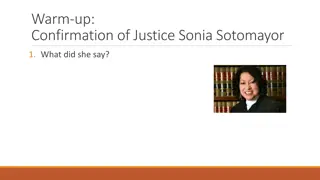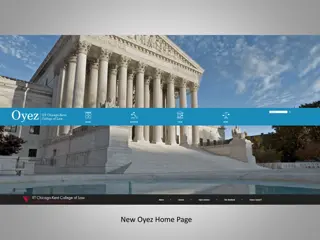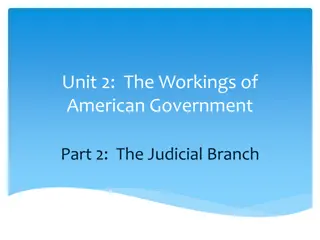Understanding the Influences on Supreme Court Decision Making
Explore the essential aspects that influence how Supreme Court judges decide cases, including issues like judicial restraint vs. activism, influences on decision-making, precedent, and judicial philosophy such as originalism. Gain insights into the complexities surrounding constitutional interpretat
0 views • 9 slides
Exciting Updates from Oyez: New Pages and Deep Dive on Shifting Scales
Discover the latest developments on Oyez platform through the introduction of new home and case pages, along with insights into the Justices. Dive deeper into the intriguing topic of Shifting Scales with a comprehensive exploration. Engage with the evolving content and stay informed.
0 views • 4 slides
George Washington's Presidency: Establishing Governmental Precedents
George Washington, as the first President of the United States, set important precedents during his two terms in office from 1789 to 1797. He established the federal court system under the Judiciary Act of 1789, appointed the first Supreme Court justices including John Jay, and formed the first Pres
0 views • 16 slides
Understanding Certification of Legal Questions in the Judicial Process
Certification of legal questions involves process where courts seek clarification or confirmation on legal matters through higher authorities. This includes certification steps in federal and state courts, the role of parties, judges, and justices, and the final resolution of certified questions. Th
0 views • 12 slides
Understanding Political Affiliation and Bias in Analyzing World Events
Explore the impact of political affiliation on analyzing world events, instances of biases in predictions, anomalies in election cycles, and the ethical dilemma faced by Supreme Court justices in making public comments about candidates. Delve into Nate Silver's predictive failures and the case study
0 views • 8 slides
Overview of Courts and Legal System in Greece
The legal system in Greece is structured around ordinary and special courts, with judicial power vested in the courts of law. The system includes ordinary civil, criminal, and administrative courts, along with special courts for specific cases. The three jurisdictions - civil, criminal, and administ
0 views • 22 slides
The American Judicial Branch: Structure and Judicial Review
The American judicial system consists of District Courts, Appellate Courts, and the Supreme Court. District Courts handle initial cases, Appellate Courts hear appeals, and the Supreme Court is the highest authority. Justices are nominated by the President and confirmed by the Senate. Judicial review
0 views • 12 slides






